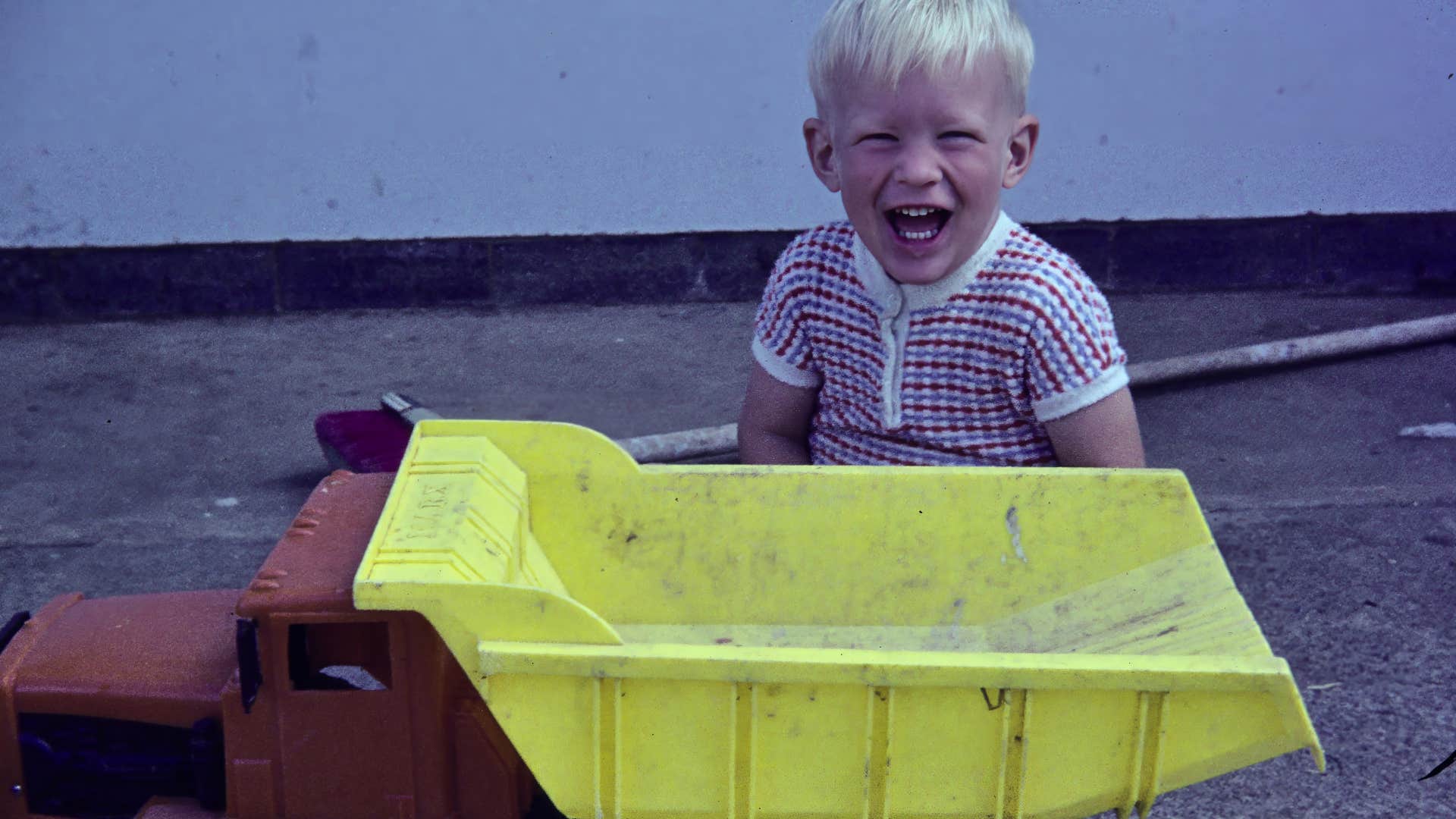11 Odd Things People Post When They're Trying To Look Happy But Obviously Aren't
People share a lot about themselves on social media, but much of it isn't as it seems.
 Photo Book Pro | Shutterstock
Photo Book Pro | Shutterstock For better or worse, social media has evolved into more than just a means of staying connected with friends and family. Instead, many people use it as a digital diary. They share all of their thoughts and feelings, but not always in the most obvious ways. Some people feel trapped between the desire to get things off their chest and the need to appear perfect. This can lead to some odd posts in which people try to make it seem like they’re happy, but you can tell they really aren’t.
Psychologist Dr. Wendy Rice insisted that “some people take their social media presence too seriously.” She said, “It gives users constant pressure to share and appear perfect with the goal of being socially accepted.” People want to share their highlight reels on their accounts and forgo anything less than perfect. But what happens when someone is having a hard time, or when someone wants to be more honest about their struggles? It can lead to some odd posts.
Here are 11 odd things people post when they’re trying to look happy but obviously aren't:
1. Heavily filtered or staged photos
 NastasiaRudenko | Shutterstock
NastasiaRudenko | Shutterstock
One odd thing that people post when they’re trying to look happy but aren’t is pictures that are overly filtered or staged. Technically, most pictures that make it to social media are staged. There are very few candids to speak of. But people who are trying to look happy when they aren’t will carefully curate whatever they post so that it looks just right. Or, maybe they’ll put a filter on the picture so that it looks better, and perhaps makes them feel better too.
While posting a perfect photo may feel gratifying in the moment, research suggests that using filters has a negative effect on one’s mental health. A study published in Computers in Human Behavior concluded that people who used filters on their own selfies experienced higher levels of social comparison and body dysmorphia. In an effort to make their social media feed more perfect, people might actually be making their mental health even worse than it already is.
Someone who is trying to look happy will likely equate that with perfection. If they can present a perfectly curated front, then other people will believe that they are happy. The unfortunate thing is that in many cases, this is true. People tend to take what they see at face value, and when they see something that looks good they expect that it is good.
2. Constantly posting positive quotes
 Yaroslav Astakhov | Shutterstock
Yaroslav Astakhov | Shutterstock
Most social media users have shared a quote that could be classified as positive on their accounts at some point. However, if that’s all that’s being shared, it’s likely a sign that they’re trying to cover up something darker. Nothing but repeated positivity can become toxic, and that’s a sure sign that someone isn’t really happy.
According to Kendra Cherry, MSEd, toxic positivity is the idea that you should always be positive, no matter what is going on in your life. But that’s not an accurate representation of the complexities of life. Not only does it shame and guilt people, but it’s also a form of avoidance. “When people engage in this type of behavior, it allows them to sidestep emotional situations that make them feel uncomfortable,” she said.
Someone who is going through something hard in their life but trying to still appear happy will probably share a bunch of positive quotes on social media that are the complete opposite of what they’re really feeling. Maybe they see it as some kind of manifestation, or maybe they just want to ignore what’s wrong. Either way, it’s a clue into someone’s real mindset.
3. A string of throwback photos
 BJP7images | Shutterstock
BJP7images | Shutterstock
Someone who’s trying to look happy but obviously isn’t may post throwback pictures to bring back the same good vibes that they felt then. They’ll want to reshare pictures from happier times to remind themselves of what it felt like, and to show the world a time when things were better for them. Of course, a throwback picture here and there can be innocent enough, but only sticking to them with no new content is a sign that someone is trying to relive the good old days.
In addition to reliving better times, throwback pictures can actually help alleviate feelings of loneliness. A study published in Psychological Science found that nostalgia increases the amount of social support someone feels. Therefore, when someone goes back and looks at old photos, they tend to feel less lonely.
If someone is struggling with feelings of unhappiness, they may seek out nostalgic experiences so they feel less alone. One of the easiest and quickest ways to do so is to go through old pictures and share some on social media. If you see someone posting a lot of throwbacks, there’s a chance that they’re going through something difficult and trying to find comfort.
4. Lots of motivational captions
 TetianaKtv | Shutterstock
TetianaKtv | Shutterstock
Again, motivational posts in and of themselves aren’t necessarily a bad thing. But if someone is sharing a lot of posts with motivational captions, it could mean that they’re trying to send themselves a subconscious message. Motivational posts feel happy, so it would make sense that the person posting them is happy. However, they could be masking something else.
Author Paul Jarvis explained that there is research to back up the fact that people feel better after they see a motivational quote. In his opinion, though, they don’t do very much good. “I also think these quotes have the opposite effect the person posting them is after,” he said. “That’s because they make us feel good and make us feel like we can accomplish something … but without actually accomplishing anything.”
Someone who posts motivational things may be trying to chase that motivated feeling, but actually be completely missing it. Instead, they may be deeply unhappy and simply looking for something to make them feel better. Although they may seem silly to some, that person may desperately need those motivational words.
5. Relationship highlight reels
 DavideAngelini | Shutterstock
DavideAngelini | Shutterstock
If someone is unhappy, there’s a good chance that it could be due to relationship woes. Vicki Larson, one of the authors of “The New ‘I Do,’” said that six of every 10 people are not happy in their relationships, and four in 10 have considered leaving their partner. It wouldn’t be a huge stretch to say that relationship problems are one of the top causes of unhappiness.
To counteract this, some people may post pictures that make their relationship look like it’s the very definition of goals. Or, maybe they’ll share an anecdote about something sweet their partner did. Whatever the post may consist of, they’re likely to make their relationship sound or look as perfect as possible.
While some people really are happy in their relationships, sharing things that look like classic “relationship goals” can be a sign that someone is trying to make everyone think they are happy when they’re really not. Their relationship could be in turmoil, but they would never let that be known publicly. Instead, they’ll hide behind cute couples’ photos that don’t tell the real story.
6. Long-winded captions about the past
 PeopleImages.com - Yuri A | Shutterstock
PeopleImages.com - Yuri A | Shutterstock
Usually, social media captions are short and sweet. There’s no need to exceed the character limit to get your message across. When those captions start to get long, though, it’s a sign someone may not be doing well. People seldom say a lot because they have good things to share. If a caption feels more like a speech that dives into past issues, someone is definitely not doing well.
The truth is that discussing traumatic events from the past can actually be helpful. It’s uncomfortable, but it’s also vital to the healing process. Author Ellen Hendriksen, PhD, shared that if someone wants to get support or process what they’ve been through, then they have to be willing to share it, even if it’s hard. However, it’s important to find an appropriate space to do so.
Social media is really not the answer. Sometimes hard things must be shared with family and friends so they know what’s going on, but that doesn’t mean that hard things from the past should be processed in someone’s social media captions. Long captions that touch on past hurts are usually signs someone is not happy.
7. Braggy vacation pics
 maxbelchenko | Shutterstock
maxbelchenko | Shutterstock
Vacation photos are a social media staple, but they could be a sign of something more sinister. Vacation pictures are like the ultimate chance to brag. Whether you’re showcasing pristine beaches or snowy mountains, you’re sure to make others envious of your getaway. The problem is, some people post pictures from their vacations to make their lives look better and erase the hard parts.
Psychologist and social envy expert Dr. Andrea Bonoir said, “The internet has made it so much easier to find ways to be envious. We now see things daily that we would not have been able to see, say, 20 years ago, because of social media. Back then, we didn’t have the opportunity to compare ourselves as much as we do now.”
If someone is purposely using their vacation pictures to make others envious, they may have motives other than just wanting to show off for their friends. Instead, it’s more likely that they feel like their lives are out of control and falling apart. The one thing they can control is their image. For that reason, they post vacation photos, making all of their friends jealous.
8. Captions that don't match the photo
 PeopleImages.com - Yuri A | Shutterstock
PeopleImages.com - Yuri A | Shutterstock
Have you ever seen a smiling selfie with a caption that talks about how much the person has been through? It can feel awkward and uncomfortable, and it’s a sign that someone’s not doing well. Posting a happy, upbeat photo with a caption that doesn’t align with it's almost like a cry for help. No one who is genuinely happy is going to post a negative caption with a perfectly good picture.
Clinical psychologist Dr. Marni Amsellem, PhD, noted that some people share their mental health experiences on social media in an effort to seek support and educate others. However, there may be situations where someone genuinely requires more than a well-intentioned comment on their post. In such cases, Dr. Amsellem advised reaching out promptly and being serious about the help you’re willing to offer.
If you’re worried about someone, never be afraid to reach out and offer your help. On the other hand, if you feel like someone is just posting because they’re going through something tough but they aren’t in immediate need, you can keep them in mind and speak to them the next time you see them.
9. Only ever being alone
 fizkes | Shutterstock
fizkes | Shutterstock
If someone is spending an awful lot of time alone, it could be a sign that things aren’t happy in their personal life. Everyone needs alone time every now and then, but being completely alone could be a sign that they are pushing people away or have recently lost some friends. Everyone needs people who will support them, and while you’re certainly not required to post on social media when you hang out with friends, it is concerning if you seem to suddenly be spending all of your time alone.
Friendship brings with it a multitude of benefits. According to the Mayo Clinic, friends can do everything from increasing happiness and self-confidence and decreasing stress to helping you through hard times and encouraging you to live a healthier lifestyle. We all need people in our corner we can depend on.
When someone goes from regularly posting about hanging out with friends and family to having no one with them, it’s likely a sign that things are not going well for them. Whatever the circumstances are, something has driven a wedge between them and those they care about the most. It would be good to reach out and offer to be there for them if they need support.
10. Oversharing every little detail
 DimaBerlin | Shutterstock
DimaBerlin | Shutterstock
People who aren’t happy may attempt to cover it up by sharing a little bit too much on social media. Of course, not everything they share may be completely accurate. They’ll go on and on about how wonderful their life is, how much they love their family and how great things are happening for them. It’s all nothing more than a facade, though. In reality, they aren’t happy at all, and everything they share is fake.
By oversharing in this way, people attempt to assure others, and possibly themselves, that everything is okay even though it’s not. In a study published in Computers in Human Behavior Reports, researchers found that people defined oversharing as both “posting ‘too much’ personal information” and “posting too often.” Someone trying to appear happy may do either one of these things, or both, in an effort to seem happier than they are.
Oversharing can be a sign that someone is struggling. Instead of judging someone for posting too frequently or getting too personal, try to be understanding and know that things might be hard for them right now. They could certainly use the support.
11. Vague posts that hint something's wrong
 LightField Studios | Shutterstock
LightField Studios | Shutterstock
Some people may go so far as to imply something is wrong in their social media posts. This could be a cry for help, or just a ploy to get attention. Maybe they really do need that attention, but making the implication that something is wrong on social media isn’t the best way to go about getting it. Really, it draws the focus off of others and gives them center stage.
VeryWell Mind writer Wendy Wisner defined attention-seeking behavior as “a human instinct to want to be noticed, taken seriously and loved.” That’s not all that bad, and Wisner admitted that most of us could probably relate to it. However, it can cause problems. “The problem is … when attention-seeking behaviors are motivated by a feeling of low self-esteem, jealousy, loneliness or because of a psychiatric condition,” she added.
Saying something is wrong on social media isn’t inherently bad, but if it’s done for attention-seeking reasons, it can be less than honorable. Either way, it’s a sure sign that someone is unhappy and searching for more in their life. While there’s nothing wrong with that, this might not be the wisest way to go about doing it.
Mary-Faith Martinez is a writer with a bachelor’s degree in English and Journalism who covers news, psychology, lifestyle, and human interest topics.

